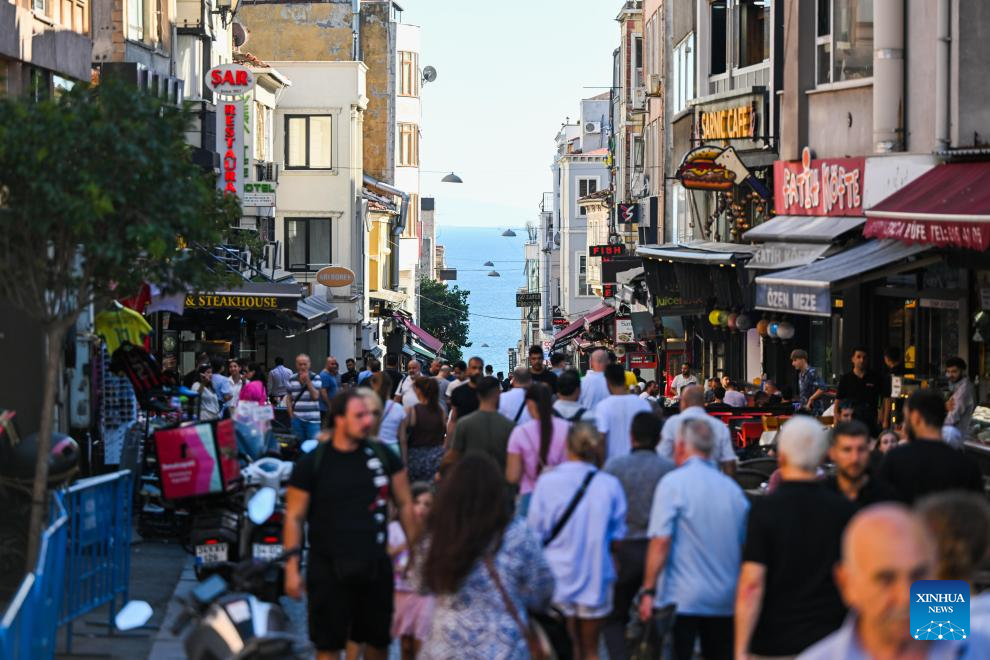EBRD, Türkiye discuss strategies for a low-carbon future in the run-up to COP28

-
President Renaud-Basso meets Türkiye’s Minister of Industry and Technology -
Meeting involved a discussion of findings from low-carbon pathways study -
Pathways to focus on the steel, cement, aluminium and fertiliser sectors
In the run-up to COP28, President of the European Bank for Reconstruction and Development (EBRD) Odile Renaud-Basso has met with Minister of Industry and Technology of Türkiye Mehmet Fatih Kacır in Ankara to discuss the findings of an EBRD-led study into low-carbon pathways (LCPs) in the steel, cement, aluminium and fertiliser sectors.
Cumulatively, industry emits 37% of total Turkish GHG emissions; accelerating their decarbonisation is critical for Türkiye to meet its carbon neutrality commitment by 2053.
The study was conducted by PWC Türkiye and GTE, with extensive engagement by sector associations and consultation with relevant stakeholders. It entailed the modelling of demand scenarios for all four sectors and the identification of the investment requirements to achieve net zero by 2053.
The findings of the LCP study will provide clear signals to private industry players, financiers and investors about the technology requirements and timing of decarbonisation investments, enabling greater understanding of the risks involved and informing the development of specific financing plans.
In 2022, in the context of the climate change memorandum of understanding between Türkiye and international partners, the Ministry of Industry and Technology proposed a detailed study, led by the EBRD, to assess the technology solutions, the investment needs and the policy enablers to help the sectors in question decarbonise in line with Türkiye’s climate ambitions.
The LCPs are also an important input into the design of the emissions trading scheme the government plans to implement to promote the cost-effective decarbonisation of industrial operations in the country.
Overall, the study estimates that the decarbonisation of these sectors will require investments in the region of more than USD 50 billion and will result in cumulative GHG emission savings of more than 135MtCO2 compared to a business-as-usual scenario by 2053.
The formal launch of the LCPs will be organized by the EBRD and the Ministry of Industry and Technology in the near future, with the participation of all industry players, as well as technology providers and financial institutions.
During the meeting, Minister Kacır and the President discussed new areas of cooperation, building on the LCP work, to support the industrial sectors in implementing their decarbonisation investments, such as setting up a dedicated investment and finance country platform. The platform aims to support the preparation of company-level investments and financing plans, while facilitating interactions between industrial firms, international financial institutions and commercial banks.
Speaking on the study, Minister Kacır said that “the decarbonisation of industrial processes is key to preserving and enhancing the competitiveness of the Turkish industrial sectors on a regional and global scale, as well as to continuing to attract foreign direct investment to the country. We are very pleased to be cooperating with the EBRD and look forward to establishing effective mechanisms to provide the finance needed to accelerate investments to support the low-carbon development of Turkish industry.”
President Renaud-Basso thanked the Minister for his cooperation, saying: “Türkiye is one of our biggest countries of operation and we are keen to continue supporting industrial companies on their journey towards carbon neutrality. It’s a core priority for the country and it’s a core priority for the EBRD. We aim to continue our collaboration with the Ministry and all relevant Turkish and international partners on the implementation of sectoral LCPs.”
To date, the EBRD has invested more than €19 billion in the Turkish economy, largely in the private sector.



